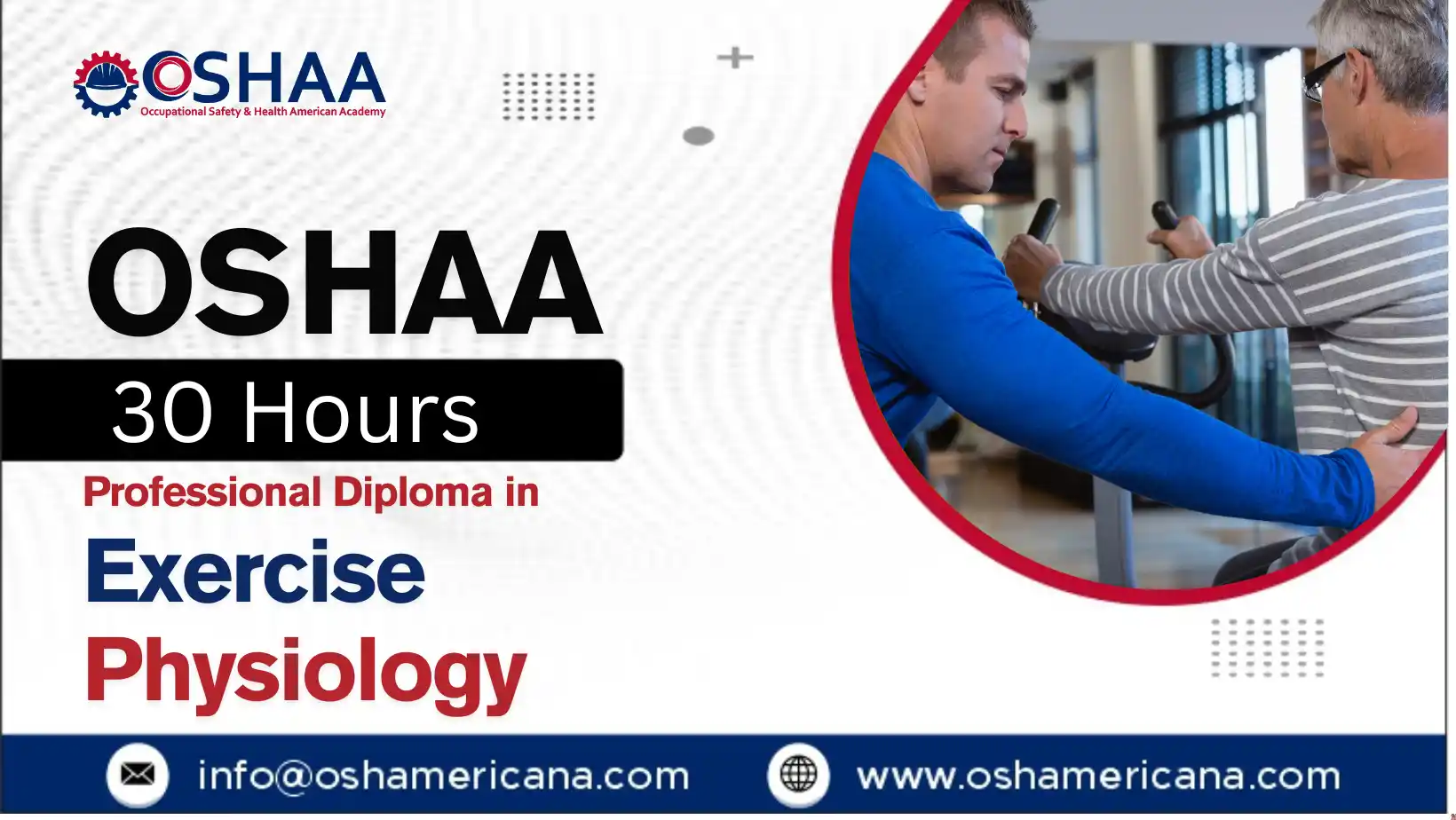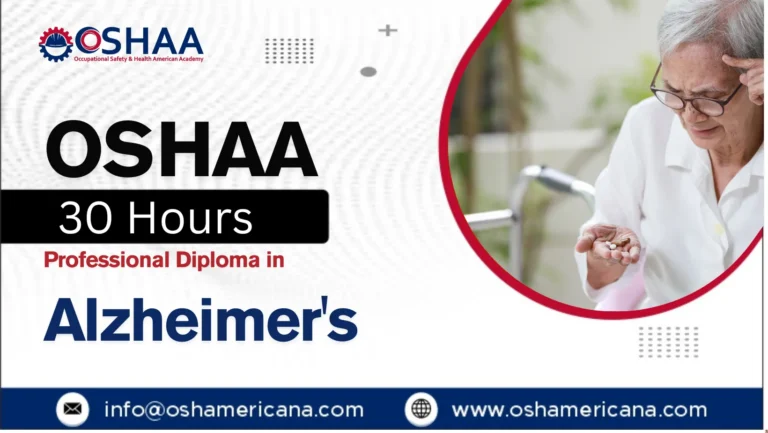Master Exercise Physiology: Get Your Professional Diploma
The OSHAA 30-Hours Professional Diploma in Exercise Physiology is engineered to certify your advanced competency in this critical scientific discipline. Successfully completing this rigorous course grants you a distinguished professional credential that validates your expertise, enhancing your credibility and authority within the fitness and wellness industry. This diploma positions you as a leader capable of applying complex physiological principles to achieve superior, measurable results for every client.
This intensive and specialized diploma is designed for fitness and health professionals seeking to elevate their scientific understanding of human physical performance and adaptation. The curriculum delivers a focused exploration of the core physiological systems—cardiovascular, respiratory, muscular, and metabolic—and their acute and chronic responses to exercise. You will build a robust, evidence-based foundation that directly translates to designing more effective, individualized, and goal-specific training interventions for diverse client populations.
The program then advances to apply this foundational knowledge to practical, real-world scenarios, bridging the gap between theory and practice. Key modules cover advanced concepts in energy systems, environmental physiology, and the physiological basis for strength, endurance, and flexibility programming. This practical application empowers you to conduct more nuanced client assessments, interpret physiological data, and develop sophisticated conditioning strategies that optimize performance, health outcomes, and safety.
OSHAA 30-Hours Professional Diploma in Exercise Physiology
Study Units
Learning Outcomes
Introduction to Exercise Physiology and Homeostasis (3 Hours)
This unit introduces the scientific foundations of exercise physiology, focusing on how the human body responds and adapts to physical activity. Learners explore the concept of homeostasis and understand how the body maintains internal balance during rest and exercise. The session also examines acute physiological responses to exercise stress and long-term adaptations that occur with regular training, establishing a framework for understanding performance, health, and recovery.
Cardiovascular and Respiratory Responses to Exercise (4 Hours)
This section explores how the cardiovascular and respiratory systems work together to meet the increased demands of exercise. Learners examine changes in heart rate, stroke volume, cardiac output, ventilation, and breathing efficiency across different exercise intensities. Emphasis is placed on oxygen transport and utilisation, as well as long-term cardiovascular adaptations such as improved endurance, efficiency, and aerobic capacity resulting from consistent training.
Muscle Structure, Function, and Adaptation (4 Hours)
This unit focuses on the anatomy and physiology of skeletal muscle, including muscle fibre types and their functional characteristics. Learners gain an understanding of muscle contraction mechanisms and force production. The session also covers adaptations to resistance training, such as muscle hypertrophy and neural improvements, highlighting how structured training enhances strength, power, and muscular endurance.
Energy Systems and Metabolic Function During Exercise (5 Hours)
This unit examines how the body produces energy to support physical activity. Learners explore the ATP-PC, glycolytic, and oxidative energy systems and how each contributes to performance at varying intensities and durations. The relationship between metabolism, nutrition, and exercise performance is analysed, enabling learners to understand how energy availability influences training outcomes and fatigue management.
Hormonal Regulation and Endocrine Responses to Physical Activity (3 Hours)
This section explains the role of the endocrine system in regulating exercise responses and recovery. Learners identify key hormones involved in energy regulation, muscle growth, stress response, and adaptation. The unit also explores how different types of training influence hormonal balance and how long-term exercise leads to beneficial endocrine adaptations that support performance and overall health.
Neuromuscular Function and Motor Control in Exercise (3 Hours)
This unit focuses on the interaction between the nervous system and muscles during movement. Learners examine neuromuscular pathways, motor unit recruitment, and coordination patterns that enable efficient movement. The impact of training on neuromuscular efficiency, skill development, and movement control is analysed, highlighting the importance of neural adaptations in performance enhancement.
Principles of Training and Physiological Adaptation (5 Hours)
This unit introduces key training principles such as overload, specificity, progression, and reversibility. Learners develop the ability to design structured training programmes that target specific physiological adaptations. The unit also emphasises evaluating training outcomes and making informed adjustments to programmes to ensure continuous improvement and long-term progression.
Exercise Prescription for Health and Chronic Disease Management (3 Hours)
This final unit focuses on the application of exercise physiology in health promotion and disease management. Learners explore how physical activity supports the prevention and control of chronic conditions such as cardiovascular disease, diabetes, and obesity. Emphasis is placed on developing safe, effective, and evidence-based exercise prescriptions tailored to individuals with diverse health needs in both clinical and community settings.
Course Benefits – OSHAA 30-Hours Professional Diploma in Exercise Physiology
- Develop a deep understanding of how the human body responds and adapts to physical activity
- Gain scientific knowledge of energy systems, cardiovascular function, muscle mechanics, and hormonal responses during exercise
- Learn how to apply physiological principles to design safe and effective training programmes
- Understand the role of exercise in the prevention and management of chronic health conditions
- Acquire practical skills in assessing physical performance and tailoring interventions for diverse populations
- Strengthen capabilities in analysing fatigue, recovery, and overtraining to optimise performance and health outcomes
- Enhance career opportunities in fitness, sports science, health promotion, and rehabilitation sectors
- Build confidence in applying evidence-based strategies in both clinical and non-clinical environments
- Stay current with developments in exercise physiology and its applications across multiple disciplines
- Achieve a recognised professional diploma that demonstrates applied expertise and supports continuous professional development
This course is ideal for individuals working in or aspiring to roles where a strong understanding of exercise science and human physiology is essential. It is particularly suited to:
- Fitness professionals and personal trainers seeking to deepen their scientific knowledge of physical performance
- Sports coaches and athletic development specialists aiming to improve training outcomes
- Physiotherapists and rehabilitation practitioners integrating exercise into recovery plans
- Health and wellness coaches supporting clients in achieving physical health goals
- Individuals involved in chronic disease management and health promotion programmes
- Professionals in sports science, kinesiology, or biomedical fields seeking applied knowledge in exercise physiology
The diploma is also valuable for participants looking to advance their career, enhance client outcomes, or prepare for further study in exercise science or related disciplines. No prior academic background in physiology is required to benefit from this course.







